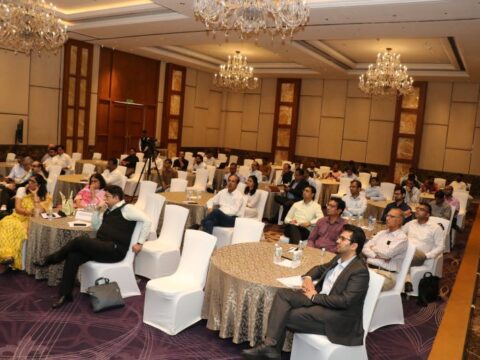Third stakeholder consultation workshop on “Strategies for Scaling Rooftop Solar Deployment in India” in Ahmedabad, Gujarat
India’s target of achieving 40 GW of rooftop solar installation faces a major obstacle, one of which is high cost of rooftop solar equipment, dissuading small sized vendors from purchasing in bulk for better deals, thus hampering their ability to offer competitive prices and slowing down widespread adoption. To address this, Energy Efficiency Services Limited (EESL) is designing aggregation-based model for cost effective supply of PV modules & solar inverters to installers. USAID’s SAREP program partnered with EESL to organise a series of stakeholder consolations engaging Solar PV Module and Inverter Manufacturers, and EPC companies to explore bottlenecks within the rooftop solar supply chain that limit scaling. The series commenced with the inaugural consultation for north zone stakeholders in national capital New Delhi, followed by a workshop in Visakhapatnam targeting southern India stakeholders and the final workshop of the series concluded in Ahmedabad for western India on May 9th, 2024.
The workshop aimed to address challenges in rooftop solar adoption, evaluate supply-demand dynamics, examine manufacturing hurdles, and explore cost-effective supply models for EPC players. Experts deliberated on the potential benefits of an aggregated model for cost-effective supply of photovoltaic modules and inverters, alongside engaging in discussions with the EPC companies. Over 70 key stakeholders from PV module and solar inverter manufacturing companies, EPC players, and domain experts participated in the discussions.
Ms. Apurva Chaturvedi, Senior Regional Clean Energy Specialist at USAID India, lauded Gujarat’s exemplary leadership in advancing rooftop solar deployment, highlighting its impressive 3.5 GW installed capacity as a model for other states to emulate.
Mr. Vishal Kapoor, CEO of EESL, underscored India’s aim of deploying 40 GW of rooftop solar and Gujarat’s notable success in leading the nation in installation rates. He also acknowledged challenges encountered by manufacturers and rooftop solar installers and suggested a collaborative approach among stakeholders to find solutions, including exploring an aggregated model for cost-effective equipment supply.
Ms. Bhakti Shamal, Additional Secretary, Energy and Petrochemical Department, Govt. of Gujarat, spoke about the state’s journey to being a leader in terms of installed rooftop solar capacity in the country. She appreciated the commitment delivered by the rooftop solar installers and manufactures and highlighted the conducive policies and market friendly mechanism adopted by Government of Gujarat in scaling rooftop solar deployment.
Some challenges that came forth in the discussion were:
- Unavailability of the PV modules complying with Domestic Content Requirement (DCR)
- Frequent fluctuation and unregulated PV module prices
- Unavailability of Indian-made solar inverters
- Slow net-metering implementation process and unavailability of net-metres
The workshop served as a valuable platform for stakeholders to share insights, brainstorm potential solutions, and chart a course for expanding rooftop solar deployment.








